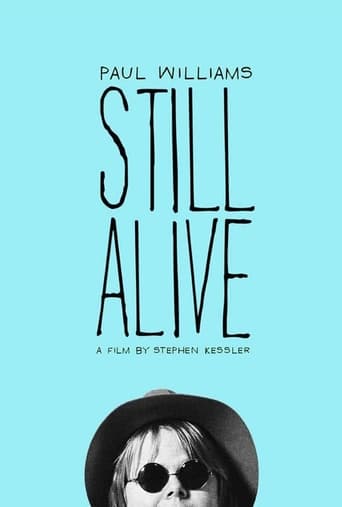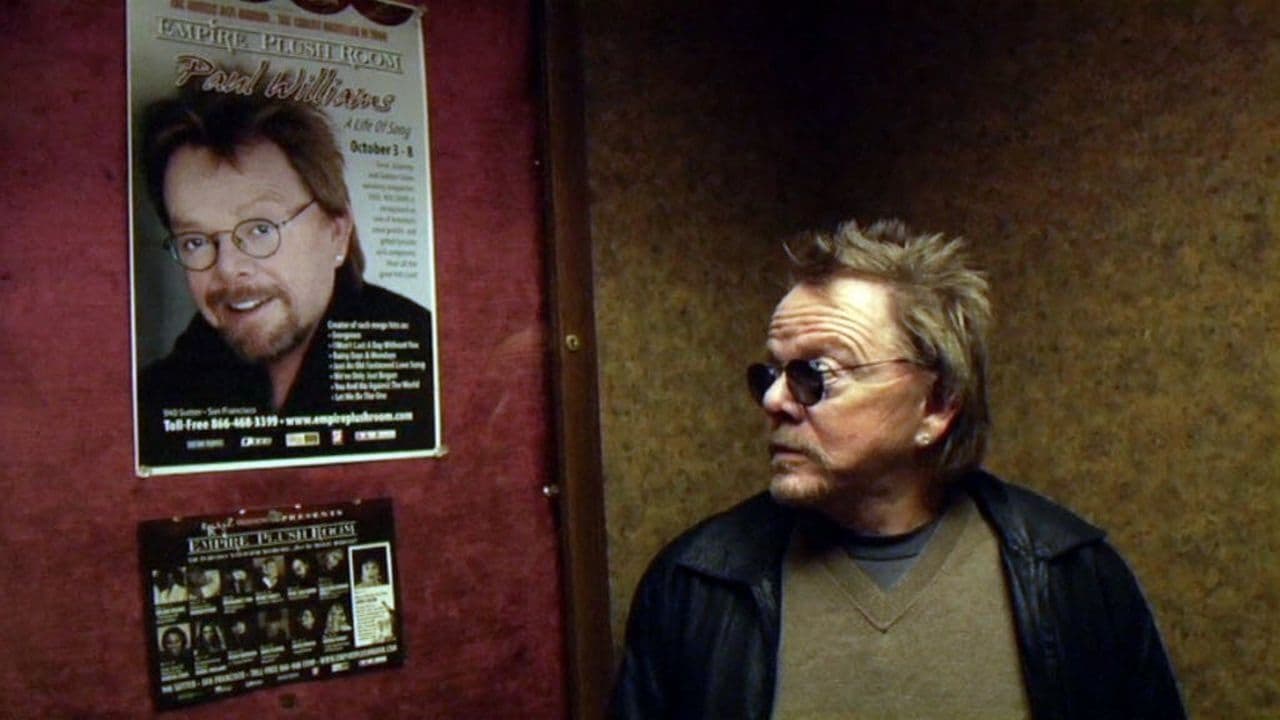David Ferguson
Greetings again from the darkness. This documentary was recommended to me by Adam, a fellow movie and music lover. Without his urging, I probably would have never taken the time to watch this ultimately fascinating and intriguing look at Paul Williams. I say that after an extremely clunky first few minutes where director Stephen Kessler, a self-proclaimed childhood fan of Williams, displays his insecurities and lack of focus as a filmmaker.The best stories have an abundance of conflict, and it turns out that the polar opposite goals of Williams and Kessler make for some spellbinding viewing. See, Kessler wants to figure out what happened to the 1970's icon and Williams simply wants to show how he has adjusted to a somewhat normal life. Kessler wants to look back, while Williams is living (happily) in the present.If you don't recognize the name Paul Williams, then you probably didn't watch TV or listen to the radio in the 1970's. The guy was everywhere! Known mostly for his prolific songwriting, he also performed, appeared in movies, TV shows, game shows and talk shows. In fact, he was a favorite of Johnny Carson and appeared on The Tonight Show fifty times. And then ... just like that ... he was gone. Drugs and alcohol destroyed his career. Now twenty years sober, he still performs - just in much smaller venues. This is man who has spent much time soul-searching. His insight into being different (difficult) or special (addicting) makes for a chilling moment.Kessler follows Williams around until he is forced to join him in front of the camera. Their strained relationship is painful to watch until things begin to turn during a long bus ride in the Phillipines. With so much of the focus on Kessler's attempt to connect with Williams, this is as much a personality analysis as it is a look at the history and current status of Williams.The final act of the film seems a bit staged as Kessler finally gets the "sleepover" at Williams' house that he had been after for 2 plus years. Reviewing old TV clips does not get the desired reaction ... Kessler never seemed to grasp what he had with this film. It's obvious that the two men now have a connection, but if you are expecting a tribute film to the glory years of Paul Williams, you will be disappointed. If instead you embrace this unusual film, you will come away impressed with the man that Paul Williams has become. It's no "Rainbow Connection" but maybe it's even more.
plex
It would seem despite Paul's erstwhile troubles with substance abuse, the undeniable being which is him, comes shining thru, but not with a spotlight but with a muted and profound glow. Just like Paul ( at least I feel this way) it took me a while to warm up to both Kessler's and his directorial approach to this documentary. At times, Kessler's approach seemed to mimic Michael Moore's stylized approach to documentary making which is to let the director's presence and his intentions/difficulties known. I agree with him that Paul Williams story is one needed to be told. Kessler lets it be known of his own neurosis and fears, and at times its a little unnerving and inappropriate as you also see this being reflected by Paul. But Paul seemingly stays cool, truncating Kessler's sometime obtrusive manner. One of the things I really liked seeing about Paul was his benevolence towards others who share the same affliction ( if thats the right word) and his very humble lifestyle; he does his own driving, books some of his own gigs, totes his own luggage, lives in a very modest home etc. He doesn't do those things out of financial necessity, yet he also does not play the martyr. He's a just a simple man who appears to acknowledge the gift of life and wants to be part of it, hands-on. On the darker side, maybe he behaves this way to distance himself from the life-style that accommodated the self-destructive behavior in the first place. Who knows? The thing that impressed me most about Paul is his ability to live in the now, and look forward, as he shuns his past and nostalgia; not an easy thing to do when you consider his height of celebrity was his past. But this also explains Paul's reservation of doing the documentary in the first place as it can only come together as a story BY delving into the past. I never got the sense Paul was trying to hide anything, it just seemed sort of pointless to him. He doesn't seem to be outwardly concerned of danger, he sky dived, he travels all over the world, and just seems genuinely happy to be a part of something. I wish there had been some insight to Paul's creative process, the film makes it seem he just sort of fell into it, perhaps stemming from, in part, to his stature. Like Paul's music, the overall tone of the documentary is the good side of sadness, and Paul teaches us, perhaps tacitly so, there IS such a thing and its not such a bad thing after all.
jim7145-611-589372
I grew up across the Whitestone Bridge from Kessler, and since we're of the same age, my memories of the 70's and Paul Williams are pretty much in sync. The five stars I gave this film is because of the achievements of Mr. William's life from an extraordinary entertainer across platforms (music, TV and film)through to his current accomplishments of sobriety, public service, a solid marriage to a good woman, and a continuing demand for his performing from audiences.I was able to get that much out of the film because of Mr. William's charisma, in spite of the intrusiveness of the director. His omnipresence in the film, his whining about his fear of the Phillipenes before going and through his entire stay was the most cringe worthy part of the movie. His constant attempts, with the subtlety of a bludgeon to embarrass Mr. Williams- from cutting him off when he started opening up about his childhood, to asking 'how does it feel to go from the heights of fame to the Gong Show', and when as a guest in Mr. William's home taping him as he watched one of the most humiliating moments of his career. I enjoy documentaries; and this was the worst one I've ever seen because Kessler's continuous insinuation into the story. He gets the blank stars.After I post this review, I'm going to see if I can catch Mr. Williams on 'The View'. I hope it's on You Tube; because I'd enjoy some material about him without having to hear Kessler's whining. Kessler made a great film barely wort the time to watch it.
camille_whitworth
This film is a must-see for anyone who grew up in the 1970s, back when you couldn't watch TV without coming into contact with Paul Williams. You'll be transported back to the days when you sat on the shag carpeting in front of your family's console television, close enough to reach out and turn the knob to change channels. And the soundtrack will conjure up memories of riding in the back seat of your best friend's parents' station wagon, listening to Casey Kasem counting down the Top 40.Archival footage of Williams skydiving in an episode of "Circus of the Stars" is inserted at three different points in the film, each time conveying a different mood, coinciding with the stages of his life. Williams describes the feeling of going from A-list celebrity at the top of the world, to depressed, isolated drug addict, to sober husband and father who finally has control of both his career and his self-esteem.Director Stephen Kessler lives out the fantasy of finding your childhood idol, getting to follow him around, and becoming close friends. Don't try this yourself, because you'll probably be arrested for stalking. Just enjoy the hilarious relationship that develops between these two men and the inspiring story they have to tell.


 AD
AD



